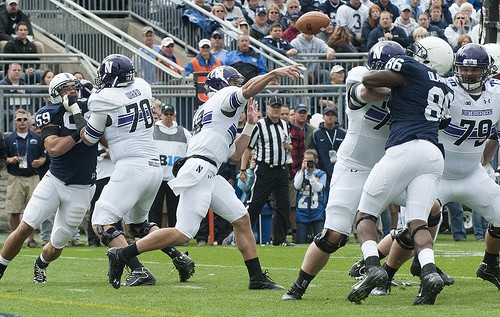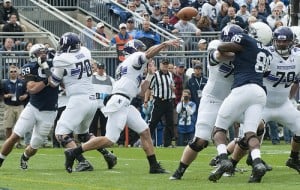Just as March Madness was gearing up, a regional director of the National Labor Relations Board in Chicago issued a relatively routine decision allowing a group of employees to unionize. This caused quite an uproar. What was so outrageous about it? Well, the employees authorized to unionize were the scholarship football players of Northwestern University. The decision has been controversial and has opened far more questions regarding the relationship between athletes, colleges and universities, and the NCAA.
The twenty-four page decision, despite its controversial subject-matter, reviews the evidence submitted both the University as well as the football players and evaluated the situation based on traditional tests used to figure out who counts as an employee. Put simply, the test is whether an individual is: “a person who performs services for another under a contract of hire, subject to the other’s control or right of control, and in return for payment.” The decision is clear that the scholarship players1 meet all four criteria.
Reading the decision, one amazing fact jumps out – these players are nearly totally controlled and dominated by the university, particularly their coaches. They spend 12-25 hours per week in football related activities in the off-season, and when regular season starts that number jumps to 40-50 hours per week. Beyond simple scheduling, control by the coaches is overbearing. From the decision:
In addition, the coaches have control over nearly every aspect of the players’ private lives by virtue of the fact that there are many rules that they must follow under threat of discipline and/or the loss of a scholarship. The players have restrictions placed on them and/or have to obtain permission from the coaches before they can: (1) make their living arrangements; (2) apply for outside employment; (3) drive personal vehicles; (4) travel off campus; (5) post items on the Internet; (6) speak to the media; (7) use alcohol and drugs; and (8) engage in gambling.
It is difficult even to consider players as students. Scholarship players are prohibited from taking certain classes that would interfere with football. They are required to miss classes. Traveling to games, they are limited in the amount of studying that they can do, in order to avoid distraction and to focus on what is really important. Indeed, quarterback Kain Colter testified that he planned on going to medical school, until he was forced to change his major due to limits placed on him by the football program, particularly an inability to take required courses. And, to top it all off, the university maintains near total discretion to terminate scholarships. Just like any boss, coaches can fire their players – their employees.
And given these realities, perhaps unionization is the best way to address stark imbalances and exploitative conditions. Players are totally prohibited from profiting in any way off the work they do, yet the university and the NCAA make millions. Players commit to total control by the university, yet live in fear of having their scholarships terminated.
The question is not whether players should be paid for their services. In fact, the decision is clear that they are being paid in the form of scholarship. The question is what voice, if any, should players have in how their lives are governed? Unions, at their best, work to establish workplace rules and guidelines, they help protect employees from arbitrary acts by the employer, they ensure some way to resolve disputes and review decisions that could hurt employees. They can help ensure competent and comprehensive medical care. And these are precisely what the players are asking for – a voice in their workplace.
So what do you think. Is unionization the way forward for Division I sports? Or will it only harm the tradition of student athletes? Let us know in the comments below.
******
Northwestern Football image courtesy Flickr user Penn State, found here.
- The decision is clear that it only applies to those players on scholarship, as they receive payment. Fascinating questions emerge on what will happen to non-scholarship “walk-on” players, as well as players in other sports, particularly women’s sports, given the requirements of Title IX. ↩



